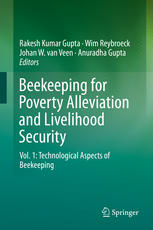

Most ebook files are in PDF format, so you can easily read them using various software such as Foxit Reader or directly on the Google Chrome browser.
Some ebook files are released by publishers in other formats such as .awz, .mobi, .epub, .fb2, etc. You may need to install specific software to read these formats on mobile/PC, such as Calibre.
Please read the tutorial at this link: https://ebookbell.com/faq
We offer FREE conversion to the popular formats you request; however, this may take some time. Therefore, right after payment, please email us, and we will try to provide the service as quickly as possible.
For some exceptional file formats or broken links (if any), please refrain from opening any disputes. Instead, email us first, and we will try to assist within a maximum of 6 hours.
EbookBell Team

4.7
96 reviewsThis Book intends to address all aspects needed to develop beekeeping into a powerful instrument of rural development and will focus on beekeeping as a tool for Poverty Alleviation and Livelihood security. In the backdrop of the social and economic issues of the people living in poverty region, the book aims to delineate specific motivation approaches to engage them in beekeeping and will serve as a guide for effective marketing through diversification and value addition of bee products. Nevertheless, marketing and environmental issues will remain an important component of this book. The aim is also to focus on indirect benefit of beekeeping so that it is integrated with farming and nature conservation. Other topics include ensuring the provision of practical techniques in handling and management of bees. It will provide detailed information on good contacts with policymakers and authorities; and channels for attracting finance especially in the third world countries. An interdisciplinary approach is the key feature of the book and it will also focus on few case histories and success stories to encourage the reader to take up beekeeping as a new venture gradually in a phased manner like traditional-transitional and modernised beekeeping. With the publication of this book, we hope to hand out a practical guide that will assist all those who are involved in beekeeping for development. We hope it will stimulate beekeeping as an integrated activity with farming and nature conservation and will serve in many households for poverty alleviation and livelihood security.